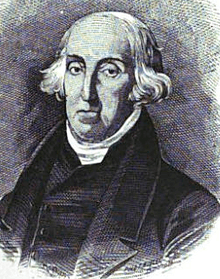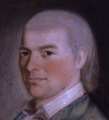Thomas Melvill (American patriot)

Thomas Melvill or Thomas Melville (1751–1832) of Boston, Massachusetts, was a merchant, member of the Sons of Liberty, participant in the Boston Tea Party, a major in the American Revolution, a longtime fireman in the Boston Fire Department, state legislator, and paternal grandfather of writer Herman Melville.[1]
Life and work
Born in Boston to Scottish-born merchant[2][3] Allan Melvill (1728-1761) and Jean Cargill (ca. 1730-1759), Thomas Melvill attended to become a minister, and attended the College of New Jersey (now Princeton University), from which he graduated in 1769.[4] In July 1773 he was awarded an honorary master of arts degree by Harvard College.[5] He married Priscilla Scollay in 1774.[6] A daughter married a brother of US Senator James De Wolf. Friends included Samuel Adams.[7]
"When the citizens of Boston began to evince a determination to resist the arbitrary, offensive and onerous exactions of the British government, Melvill was conspicuous among the ardent and gallant young men of the capital, for his zeal and intrepidity, during that momentous advent of ... national independence."[8] He participated in the Boston Tea Party, "that immortal band which in December, 1773, in presence of the Royal fleet, boarded the tea ships in Boston harbor, and threw their rich cargoes into the ocean."[8] In March 1776 when "the British fleet was driven from Boston harbor, Captain Melvill discharged the first guns at the hostile ships, from his battery, at Nantasket."[7] During the war he "served in the Rhode Island campaigns of 1777 and 1779."[9]

After the war he worked as a Naval Officer (1786–1820),[7][11] and Surveyor (ca.1796) of the Port of Boston at the Boston Custom House on State Street. (Customs houses were administered by three political appointees: the collector, naval officer and surveyor. These individuals supervised a staff which received cargo manifests from incoming ships, inspected cargoes, assessed customs duties, collected the amounts due for remittance to the United States Department of the Treasury, and fined those who attempted to evade paying the duties. The collector, naval officer and surveyor were paid a portion of the duties and fines they collected, making them lucrative and sought after positions.)[12][13] "When the custom house was established in Boston, in 1786, he was appointed surveyor; in 1789 was made inspector, and ... in 1814, he was appointed naval officer of the port."[1] He served as a town fireward (1779–1825);,[10][13] and for twenty-five years was chairman of the board;[14] an incorporator of Boston's Scots Charitable Society (1786);[15][16] a founder of the Massachusetts General Hospital (est.1811);[17] and president of the Massachusetts Charitable Society (ca.1825-1826);[18] "He was in the state legislature in 1832."[1] Melvill lived in Boston's West End "in an old wooden house on the south side of Green Street, between Staniford Street and Bowdoin Square. ... It was a wooden house of two stories."[19]
In 1830, Oliver Wendell Holmes, Sr. published a poem entitled "The Last Leaf", which was inspired in part by Melvill, "the last of the cocked hats." Holmes would later write that Melvill had reminded him of "a withered leaf which has held to its stem through the storms of autumn and winter, and finds itself still clinging to its bough while the new growths of spring are bursting their buds and spreading their foliage all around it."[20]
Death
When Major Melvill retired from the fire department, the Columbian Centinal for 31 October 1832 wrote, "his associates presented him with a Silver Pitcher, as a token of personal respect, and a public testimonial of his faithful services." In addition, the younger firemen named an engine for him. When a fire broke out at noon on 7 September 1832, in a brick building on Green Street, opposite the Melvill house, the eighty-one-year-old major responded in character. He was active by "furnishing the firemen with refreshments, having an open house to all of them," wrote the Firemen's Advocate. But in the events he "took a violent cold, which terminated in the diarrhea; and owing to his advanced age, and the violence of the disorder, medicine had no effect in checking its progress."[14] The major died on Sunday evening, 16 September. One of the city's most prominent and colorful citizens, he was mourned and eulogized for weeks. Firemen paid him a meaningful tribute, the Boston Evening Gazette reported on 22 September. "The members of the 'Melville Fire Association,' attached to the Melville Engine, No. 13, met at their Engine House - attended the funeral - and voted to wear the usual badge of mourning for thirty days."[14]
Portrait
Melvill's portrait was painted by Francis Alexander in the 1780s. It is now in the collection of the Bostonian Society, along with a portrait attributed to Benjamin Blyth,[21] and the tricorn hat "said to have been worn by Major Melvill at the Boston Massacre."[22]
References
- 1 2 3 James Terry White (1901), The National Cyclopaedia of American Biography, J.T. White, OCLC 17692533
- ↑ Copy of the Merchants Petition to the Council March 25th 1760. Boston Evening Post.; Date: 04-07-1760
- ↑ Boston Gazette, Jan. 26, 1761
- ↑ Hershel Parker, Herman Melville: A Biography. Volume One, 1819-1852, Johns Hopkins University Press, 2.
- ↑ Boston News-Letter.; Date: 07-22-1773
- ↑ Priscilla Scollay (1755-1833) was the daughter of John Scollay, and sister of William Scollay.
- 1 2 3 Francis S. Drake (1884), Tea Leaves: Being a Collection of Letters and Documents Relating to the Shipment of Tea to the shipment of tea to the American colonies in the year 1773, A. O. Crane, OCLC 57263320
- 1 2 Obituary notice of Major Thomas Melvill. Farmers' Cabinet, 10-05-1832
- ↑ Drake. 1884
- 1 2 Boston Directory. 1823
- ↑ Boston Directory. 1789, 1823
- ↑ Boston Directory. 1796
- 1 2 Fleet's register and pocket almanack. Boston: T. & J. Fleet, 1800.
- 1 2 3 Parker (1996), 76
- ↑ An act for incorporating certain persons by the name of the Scots Charitable Society. 1785. Acts and laws of the Commonwealth of Massachusetts. 1785
- ↑ "Scots' Charitable Society of Boston website". Retrieved 6 July 2010.
- ↑ An act to incorporate certain persons by the name of the Massachusetts General Hospital. 1811. Laws of the Commonwealth of Massachusetts, from February 28, 1807, to February 27, 1813.
- ↑ Independent Chronicle and Boston Patriot, September 8, 1824; September 7, 1825
- ↑ Descriptive catalogue of a map of the town of Boston in 1775. Boston: 1866
- ↑ Oliver Wendell Holmes (1923), The complete poetical works of Oliver Wendell Holmes, Boston: Houghton Mifflin
- ↑ Henry Wilder Foote (1953–1957). "Benjamin Blyth, of Salem: Eighteenth-Century Artist". Proceedings of the Massachusetts Historical Society, Third Series. 71: 64–107.
- ↑ Bostonian Society. "Catalog". Retrieved 6 July 2010.
Sources
- Parker, Hershel. (1996). Herman Melville: A Biography. Volume One, 1819-1852, Johns Hopkins University Press.
Images
 Advertisement for Allan & John Melvill, merchants, Boston, 1758. Allan Melvill was the father of Thomas Melvill
Advertisement for Allan & John Melvill, merchants, Boston, 1758. Allan Melvill was the father of Thomas Melvill Advertisement for Parker & Melvill, Cornhill, Boston, 1773
Advertisement for Parker & Melvill, Cornhill, Boston, 1773- Tea taken from the boots of Thomas Melvill, after the Boston Tea Party in 1773 (Old State House Museum, Boston)
 Portrait of Thomas Melvill, ca.1770s-1780s (Bostonian Society)
Portrait of Thomas Melvill, ca.1770s-1780s (Bostonian Society)- Portrait of Priscilla Scollay Melvill, wife of Thomas Melvill, by Francis Alexander, 1820s (Bostonian Society)
Further reading
- Oliver Wendell Holmes (1895), The last leaf, Cambridge: Houghton, Mifflin. Illus. by George Wharton Edwards and F. Hopkinson Smith.
- Daniel A. Cohen. Passing the Torch: Boston Firemen, "Tea Party" Patriots, and the Burning of the Charlestown Convent. Journal of the Early Republic, Vol. 24, No. 4 (Winter, 2004), pp. 527–586.
Excerpt from "The Last Leaf" by O.W. Holmes, Sr. (1830)... I know it is a sin
For me to sit and grin
At him here;
But the old three-cornered hat,
And the breeches, and all that,
Are so queer!And if I should live to be
The last leaf upon the tree
In the spring,
Let them smile, as I do now,
At the old forsaken bough
Where I cling.
External links
| Wikimedia Commons has media related to Thomas Melvill. |
- "Boston Tea Party Historical Society website".
- Museum of Fine Arts, Boston. "Collections".. Items owned by Melvill, such as a double chair-back settee made about 1770–1780; and pair of side chairs, made about 1770–90
- "Clipping related to Maj. Thomas Melville". New York Public Library.